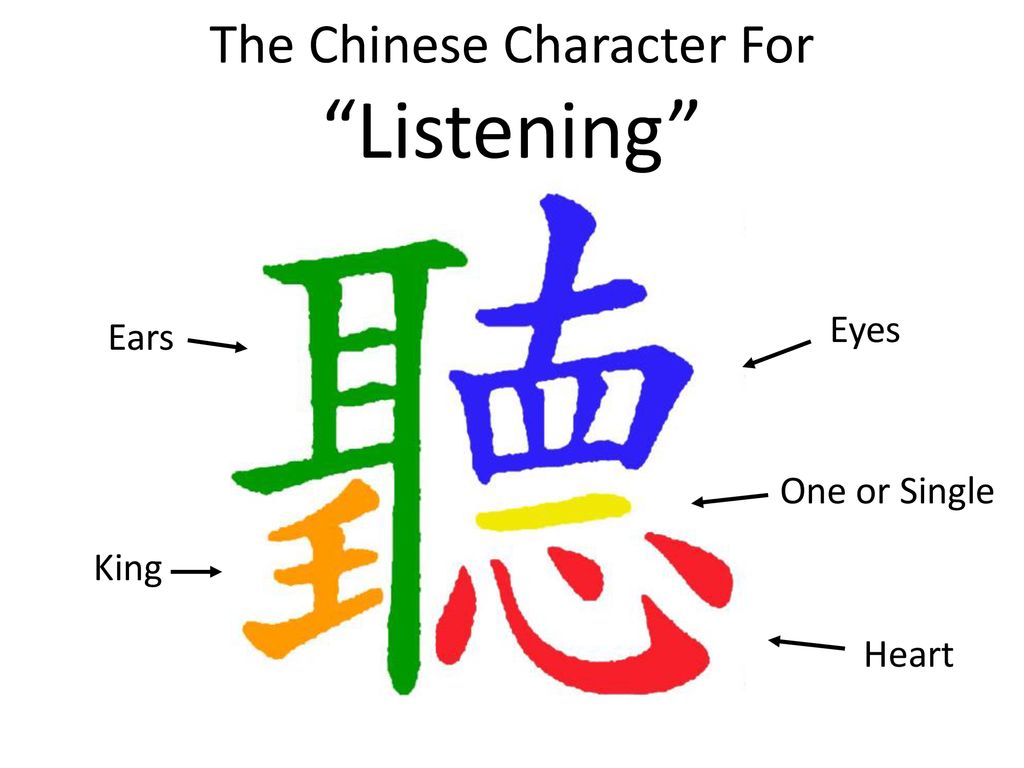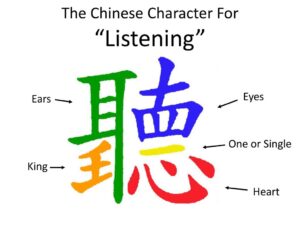

Rather than using words, traditional Chinese communicate through images. This language is pictographic and ideographic. There is usually a lack of specificity when it comes to indicating tenses, gender, single or plural, articles, or prepositions, and subjects or objects are not always indicated.
The beauty of this method lies in the fact that it doesn’t force readers to rely on semantics alone, but rather to let their imaginations run wild with the message’s emotional resonance. As the reader is encouraged to tap into his creative side and contemplate the writer’s intention, a wealth of hidden meanings might be revealed.
Explore the way the Chinese word “LISTEN” is put together. To make sense of the text that follows, please refer to the blog image above.
The characters for “ears,” “eyes,” “heart,” “king,” “solely,” and “fully” come together to form the word “listen.” In other words, you should make full use of your emotions. Listening intently with eyes, feelings, respect, and awe fixed on the speaker. Your ability to completely engage with the speaker’s words depends on the presence of this ecosystem.
This means that in order to get the most out of it, we need to listen carefully and attentively. In this fast-paced internet culture, the art of listening carefully has been forgotten. We primarily tune out in order to react to the words thrown at us.
Here we find some simple advice on how to become a better listener from the old Chinese texts.
1. Listen carefully by the ears: Put everything on hold until the speaker finishes speaking, take a few deep breaths, and maintain your concentration. Our typical pattern of attention is to skim for the essentials before jumping to a plethora of conclusions. While in this mental state, we start to think about what to say in response or what the speaker might say next. The skill of “active listening” entails tuning out all background noise and concentrating intently on what the speaker is saying. We must refrain from passing judgement, making assumptions, or offering criticism.
2. Listen with your eyes: Improve Your Listening Skills by Paying Attention Nonverbally. The Chinese believe that many things are left unsaid during a conversation. Because of this, we must maintain vigilance over the ZEN in order to gather all the necessary information, despite their limited communication. Studies done in the West today show that words only make up 7% of a discussion, while voice intonation and modulation make up 35%, and nonverbal indicators like body language make up 58%. If we want to hear someone out, we have to focus on more than just what they say. It is equally important to focus on the silences and nuances of speech. While speaking, the words one uses and the tone one adopts say far more than the words themselves.
3. Listen with Empathy: Listen with all your heart. We need to pay close attention when the speaker gets to the exciting or controversial sections of the topic. To listen empathetically, we must put ourselves in the other person’s shoes for a while (be a Sakshi to the speaker, for example).
4. Listen With Respect: A simple nod of the head or complete silence might convey your sincere interest in what the speaker is saying. Doing this will make him feel like a king, in effect. No matter what they say, you should just listen and let them vent.
Someone I get along with who isn’t quite a hottie, is young, and has less than ideal health and financial circumstances in my office. Contrary to my expectations, he never goes anywhere without young women. I wanted to know what made him tick, but all he could say was that he had an innate gift for listening intently. That concludes it. Whether it’s to vent, brag, yell, pass the buck, or curse, all of the female employees in our building know they can talk to him about it. He wins them over simply by listening attentively.
Ask yourself: Where do you think this kind of attentive listening would be most useful?
It’s everywhere, but I find it to be especially important when dealing with customers. Improving our communication and listening abilities, particularly when addressing irate consumers, can have a significant influence, even though it’s unreasonable to expect us to resolve every customer’s problem.
Most people listen to respond, not to understand, which is a major challenge. Instead of listening to truly comprehend, we are too quick to jump to conclusions. Not to mention the ever-changing, lightning-fast technological and personal environments in which we work. Normally, our minds can process 400 to 500 words per minute, but when we speak, we can only manage 150 to 200 words per minute. As a result, we tend to multitask while listening or jump to conclusions.
Here are three key pieces of advice for better listening:
- Acknowledge and affirm the speaker’s emotional state.
- In order to establish rapport and open communication, ask the other person more questions that allow them to elaborate and provide more details.
- Talk about your thoughts and, if needed, take a stand.
Simply listening can convey a variety of meanings.
Put some inner and outer silence on yourself. Next, be attentive. The advantages will surely accrue to you.
Also, feel free to forward this to your friends if you believe it addresses an important or practical matter. Pay attention to me at least once about this.
Please visit my site at https://simplifyme.in to read more of my writing if you enjoyed this post.








Онлайн платформа Мостбет доступна з будь-якого пристрою | Завантажте додаток Мостбет і отримайте доступ до всіх можливостей казино бк мост бет. | Грайте на Мостбет і відкрийте для себе світ справжніх азартних розваг | Грайте на Mostbet і скористайтеся вигідними акціями http://www.mostbetcasinouahfgy.com.